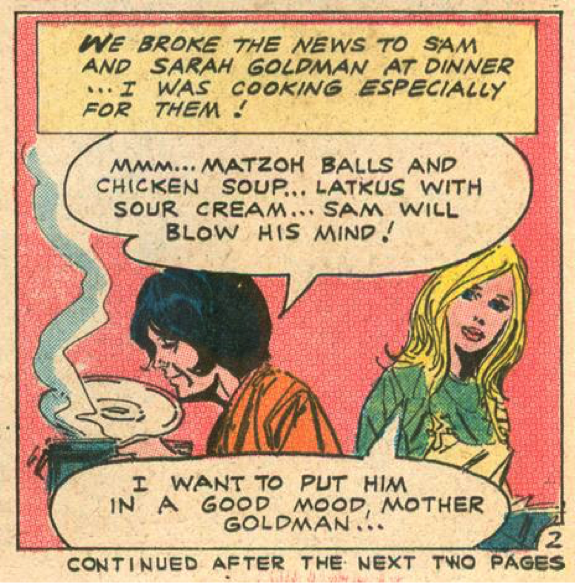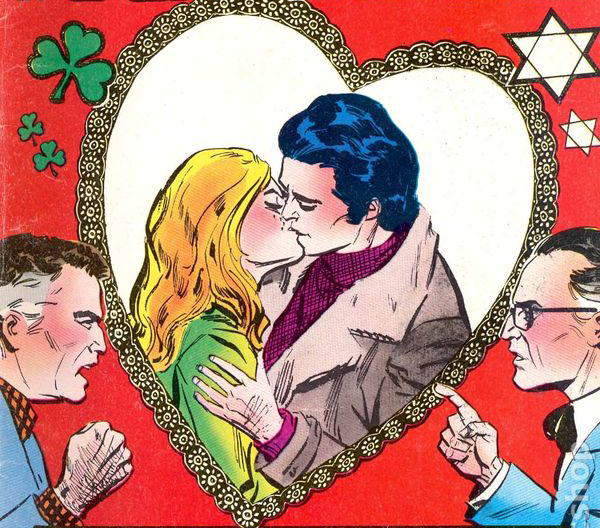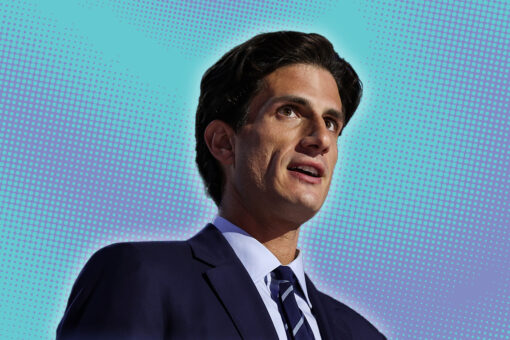In the 1970s, when my parents fell in love, they were discouraged to marry one another by almost everyone around them because of their different religious backgrounds. My mother was Catholic and my father, Jewish. They ended up marrying in a Methodist church with very little family at their sides.
My dad came from a very culturally Jewish family, but was not particularly religious, so he let my mom take the reins when it came to our religious upbringing. My mother felt very strongly that my siblings and I be raised Catholic, but even as I made my first communion at 7 years old, I knew wasn’t being true to myself. While my mom tried to convince me through young adulthood that Catholicism and Judaism were close enough (“So just be a Catholic, Jacque!”) I always knew in my heart that the tenets of Judaism called to me.
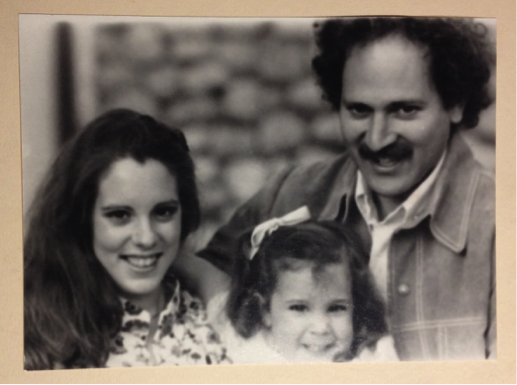
(channeling his inner Mr. Kotter).
Now that the questions of my 20s have been answered (read: what the heck am I doing with my life) I’ve begun to seriously explore the place of faith in my life. Being in an interfaith relationship myself (my fiancé is an atheist), I’ve also started to question how we will navigate the upbringing of our future children. Surprisingly, I’ve found a lot to relate to about my interfaith background in an unlikely source: a romance comic from the 1970s.
Romance comics, believe it or not, from the late ‘40s through the early ‘70s were a staple of the mainstream comic book industry. Beauty advice, date ideas, and stories of young people falling in love against their parents’ wishes filled the pages of the once-ubiquitous genre.
Nine issues of the Charlton Comics’ title Just Married from 1973 to 1974 dealt with familial disapproval set against the backdrop of societal change. Likely influenced by the 1972 CBS television show Bridget Loves Bernie, the nine-issue storyline focuses on the trials and tribulations of David Goldman — an Orthodox Jew — and Eileen O’Brien — an Irish Catholic. While some of the conflict they feel within their marriage is due to common newlywed misunderstandings, other complications arise because of their different religious backgrounds.
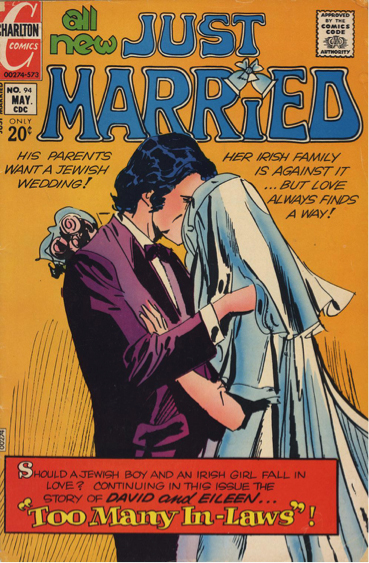
From the first time they meet and fall in love at first sight, David and Eileen know things will not be easy for them. Aware they will face scrutiny for their romance and decision to marry, the pair elope. As you can guess, neither party’s parents are pleased with the news. After a simple secular ceremony, the couple happily goes about their married lives. However, the feuding between families continues until the couple is married at Eileen’s church by a priest and at the Goldman family’s synagogue by their rabbi. On the same day.

The predicaments don’t end there. Living arrangements and whose family the couple will vacation with cause the couple to quarrel. At one point, David runs into an old friend, Ruth Rosen, who tries to rekindle their high school romance. When Eileen catches Ruth trying to kiss David, he promptly lets “Irish” (as he calls Eileen affectionately) know she’s the only woman he’ll ever love. Soon after, the couple is faced with money issues that test and consequently strengthen their trust for one another.
Part seven of the storyline is where things get serious and religion is explored more in depth (well, for a comic book anyway). Despite being a devout Jew, David attends mass regularly with Eileen. David also befriends the priest because of their mutual love of chess. One day while David is playing chess with Father Madera, Eileen is visited by David’s uncle Jacob, a rabbi. Eileen begins to question whether she should convert to Judaism to keep her husband happy, even though she is a staunch Catholic.

Eileen later discusses the matter with the Father Madera and he says not to worry, that their separate religions will never be an issue. It eventually comes to light that David’s chess sessions with the priest were actually him learning about Catholicism for a possible conversion. Though they almost pulled a sort of Gift of the Magi on themselves, David and Eileen come to the decision that they can make it work even if they are of different faiths.
Towards the end of the series, David and Eileen finally meet their neighbors. Afraid they are anti-Semitic because they have yet to be very friendly, the story takes a decidedly 1970s turn when David and Eileen learn that the neighbors are swingers!
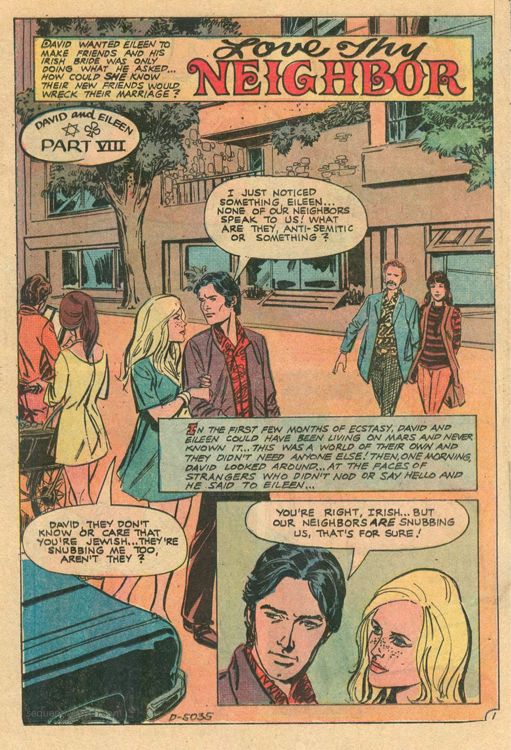
Pro-wife swapping enthusiasts, yes!
In the final issue of the series, Eileen agonizes over whether or not to get a Christmas tree. Interestingly enough, this conundrum is posed as a seemingly bigger predicament than swinging, money troubles, and in-law issues combined. Eileen settles on giving up her beloved Tannenbaum in order to respect David’s traditions. Turns out, however, that he surprises Eileen with a fully decorated tree and takes her parents to midnight Mass. And with that, David and Eileen float out of our lives just as quickly as they came in.

The story of “Jewish David and Irish Eileen” ends with a typical romance story Happily Ever After. My parents didn’t have it so easy. I know both of my grandmothers were disappointed that their new child-in-law did not share their respective love of Mother Mary and gefilte fish, and I don’t think either side ever fully accepted the marriage. While to this day I don’t know for sure if their religious differences played a part in the crumbling of their relationship and eventual divorce, the lack of support from their families sure didn’t help. I do often wonder, had they been of the same faith, would things have worked out? While I may never know the answer, I do know that I will work hard to ensure my fiancé’s and my success as an interfaith couple, and strive to ensure we get the support we need to make things work.
Unlike my own parents, I like to think that David and Eileen stayed together. Were we privy to their later in life adventures, we would see they had overcome all the hard stuff, successfully evaded swingers, and would be celebrating their 45th wedding anniversary this year. Mazel tov!
